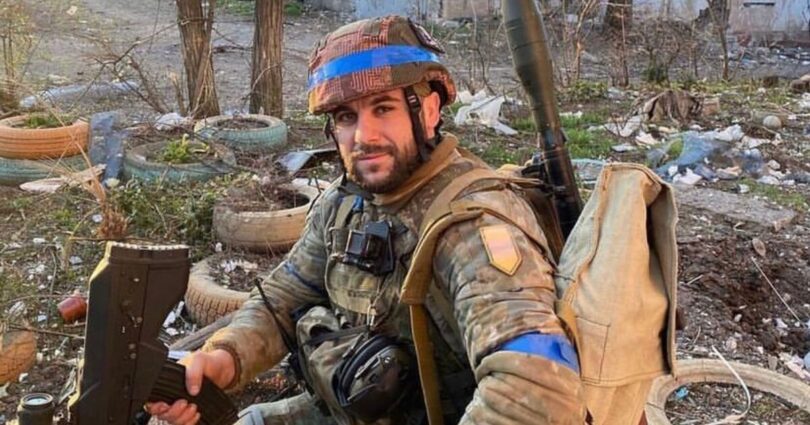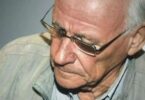Ruslan Serbov in his wartime role fighting Russia (Image: Lord Ashcroft KCMG PC)
Ruslan Serbov strides towards me sporting the physique of a man who works out in the gym every day. Barrel-chested and with tattooed biceps the size of tree trunks, he only just squeezes into his extra-large T-shirt.
The only hint he is carrying an injury comes from a slight limp in his left leg.
His broad smile, as he gives me a firm handshake, also reveals nothing of the huge sacrifices – both physical and mental – that he has made for his country since Ukraine’s all-out war with Russia began nearly three years ago. Furthermore, his black humour when discussing his serious battle wounds belies just how close he came to death while defending his homeland.
When Ruslan’s left leg was shot clean off just below the knee by a Russian anti-tank missile, his initial reaction was to ask a comrade to shoot him dead. “Not today,” was the unhelpful reply.
Minutes later, however, he seized on a photo opportunity and asked his comrade to search for his missing leg so he could pose for a picture clutching his limb. “Just imagine how cool that photo would have been – me lying on the ground, holding my own leg?” he says with a widening grin. “But my leg had flown about 100 metres away and he couldn’t find it.”
Ruslan, now 31, is one of up to 100,000 Ukrainians, most who served in its armed forces, who have lost one or more limbs during the war. He did so in the most dramatic of circumstances in the early days of the war, when he chose to fight with his former comrades in the defence of Mariupol.
The son of two entrepreneurs and the middle of three brothers, he was born in Mykolaiv, south-eastern Ukraine. From a close-knit family, he was educated in his home city before studying law at Kharkiv University, graduating in 2014.
That was the same year that Russia made its illegal incursions into Crimea and other eastern areas of Ukraine. So, instead of embarking on a career as a lawyer, Ruslan signed up for the 36th Brigade of the Marine Corps.
“There were some really tough battles going on and I felt like I needed to help my country,” he says. However, after gaining combat experience, he left the Marines in late 2016, took a short break and then voluntarily signed up for the elite Azov Brigade for three years. Based in the southern port of Mariupol, he learnt new skills and took part in several operations.

Damaged buildings being demolished by Russian workers in wake of battle of Mariupol (Image: Anadolu Agency via Getty)
In 2020, and with the war reaching a stalemate, Ruslan left Azov at a time when Russia was using disinformation to smear it as a fascist unit.
Ruslan found the claims ridiculous since he is not only Jewish but his military call sign was “David” – from the Star of David symbol of Judaism.
“Being Jewish, I would, of course, never serve in a fascist unit,” he tells me. Ruslan spent the next two years working as a bodyguard in the private security sector.
But in early 2022, realising invasion was imminent, he spent his life savings on an automatic rifle, a thermal-optical sight, ammunition and body armour to enable him to fight.
On February 24, the day of all-out war, he was in the Ukrainian capital of Kyiv. He immediately volunteered and was chosen as one of those protecting the presidential quarter in the capital.
Itching to get involved in the fighting, he started receiving messages from former comrades that the Azov Brigade was being besieged by a much larger and better equipped Russian force in Mariupol. The more he learned, the clearer it became that the Russians would eventually overrun the Azov fighters – but that only made Ruslan more determined to join them.
“I realised that it would be a one-way ticket but I had to try to help. I decided it was better to die with the guys, my friends, than do nothing,” he says.
Through his military contacts, he heard about a planned helicopter flight from the Zaporizhzhia region to re-supply the Azov soldiers with weapons, ammunition and medical supplies.
Over a secure messaging service, Ruslan was given a secret location where to meet and on what date and time. He eventually flew to Mariupol on April 5. The flight itself – in a Mil Mi-8 Soviet-made helicopter – was terrifying and everyone on board knew the aircraft was likely to be shot down by the enemy troops surrounding the city.
The craft took off at 1am and the flight lasted nearly four hours, with six people on board: a pilot, two crew and three would-be volunteers who wanted to fight.
Incredibly, Ruslan was able to catch up on sleep on his way to Mariupol. “I woke up shortly before it landed,” he told me.

Ruslan Serbov with Lord Ashcroft in Kyiv (Image: Lord Ashcroft KCMG PC)
The helicopter that had delivered him was shot down on its return journey, along with a rescue helicopter sent to help them.
This led to several people being killed, including the pilot who had flown Ruslan just hours earlier. For the next month and a half, Ruslan was involved in endless battles with Russians.
The Azov fighters had vowed to fight to the last man in the face of overwhelming odds – and miraculously, Ruslan escaped injury until the last day of the fighting on May 16. Then, having just rescued a badly wounded soldier, he found himself on the edge of the steel works, defending a raised position that both sides valued.
“I got my injury from an anti-tank rocket. I saw the missile as it was launched at me from about 400 metres away and it was being guided in flight,” he recalls.
“I thought it was going to pass to my left but all of a sudden it veered towards me. The missile immediately cut off my left leg like a knife through a sausage – it just flew away.
“It created such a strong wave that everything was sucked from my pockets. I sat down and looked at my wound and there was blood flowing from the knee down. The tourniquets in my pocket had been blasted away.
“I thought I was going to die. I was feeling weak and thought it was near the end. I saw a Ukrainian guy nearby and I shouted to him, ‘Shoot me, I don’t want to die a slow death’.
“The man ran over and said, ‘Not today.’ But he had a tourniquet and he applied it to my leg. I am sure that saved my life but the pain was incredible.”
His comrade finally managed to haul him to safety.
“We’d all had such little food for days that we were quite weak,” Ruslan explains.
To this day, he carries a photograph – too graphic for a family newspaper – of him lying down with the stump of his leg bleeding, while he sports a big smile and gives a thumbs up to the camera. Eventually, he received basic medical care, including a small dose of painkiller and an anaesthetic, in a makeshift medical centre that saved his life.

Ruslan Serbov, after losing part of his left leg, helping train Ukrainian troops (Image: Lord Ashcroft KCMG PC)
“I had to watch as the doctors used a saw to trim the bone of my leg. There was a dreadful smell, too, of burnt bone,” he told me.
Later that day, just hours after Ruslan had been so seriously wounded, the Azov Brigade followed orders from the Ukrainian Armed Forces to surrender. The brutal siege of Mariupol was over, the city was a wasteland and Ruslan, along with hundreds of other Ukrainian fighters, was taken as a Prisoner of War by the Russians.
Ruslan remained a PoW for a month and a half in a basic hospital in the Donetsk region of occupied Ukraine. His leg was infected and his flesh started rotting and smelling. He was eventually released under a prisoner exchange agreement.
In fact, he was bussed to a village in the Zaporizhzhia region and exchanged along with 120 other Ukrainian POWs. The prisoner swap took place on June 29.
Having had little food for weeks, Ruslan, who is 5 feet 7 inches tall, weighed just 10 stone compared to his normal bodyweight of 13.5 stone.
After his release, Ruslan had to undergo six further operations on his injured leg. He now has six different prosthetics to use for various activities, including running and training in the gym, where he skips on his prosthetic leg better than most men with two legs.
Today he runs his own business and also trains young soldiers. He looks more to the future, not the past.

Ruslan Serbov being interviewed in Kyiv (Image: Lord Ashcroft KCMG PC)
In December, his wife, Lyubov, gave birth to their first child, a boy called David.
“I am not a hero. I just got really lucky and, against all my expectations, I came out alive,” said Ruslan, who has been decorated for his bravery.
He thanks the West for its support in the war but believes Ukraine’s allies need to do more supplying weapons, ammunition and money. “We are shielding the whole of Europe from Russian aggression – and Russian imperialism will not stop with Ukraine,” he says.
The sacrifices made by Ruslan and millions of his countrymen are huge.
My admiration for Ruslan and those who have risked, or given, their lives for their nation and wider freedoms has no bounds and, whatever Donald Trump might think, this is not the time for the West to start reducing its support for Ukraine.
Finally, I asked Ruslan if he ever regretted flying to be with his former comrades in their hour of need.
“No, never. I don’t regret going to fight for my country and with my guys,” he insists with a smile.
“If I could rewind time to the moment when I had the choice whether or not to get on that helicopter to go to Mariupol, I would definitely get on it again – just with a better sight for my gun so that I could have taken out even more enemy soldiers.”
- Lord Ashcroft KCMG PC is an international businessman, philanthropist, author and pollster. For more information on his work, visit lordashcroft.com Follow him on X/Facebook @LordAshcroft
Source link








